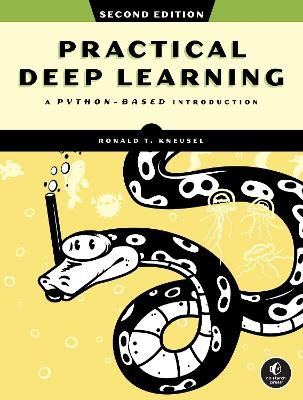
Practical Deep Learning, 2nd Edition
No Starch Press,US (Verlag)
978-1-7185-0420-2 (ISBN)
- Noch nicht erschienen (ca. Juli 2025)
- Versandkostenfrei innerhalb Deutschlands
- Auch auf Rechnung
- Verfügbarkeit in der Filiale vor Ort prüfen
- Artikel merken
If you’ve been curious about artificial intelligence and machine learning but didn’t know where to start, this is the book you’ve been waiting for. Focusing on the subfield of machine learning known as deep learning, it explains core concepts and gives you the foundation you need to start building your own models. Rather than simply outlining recipes for using existing toolkits, Practical Deep Learning, 2nd Edition teaches you the why of deep learning and will inspire you to explore further.
All you need is basic familiarity with computer programming and high school math—the book will cover the rest. After an introduction to Python, you’ll move through key topics like how to build a good training dataset, work with the scikit-learn and Keras libraries, and evaluate your models’ performance.
You’ll also learn:
How to use classic machine learning models like k-Nearest Neighbors, Random Forests, and Support Vector Machines
How neural networks work and how they’re trained
How to use convolutional neural networks
How to develop a successful deep learning model from scratch
You’ll conduct experiments along the way, building to a final case study that incorporates everything you’ve learned.
This second edition is thoroughly revised and updated, and adds six new chapters to further your exploration of deep learning from basic CNNs to more advanced models. New chapters cover fine tuning, transfer learning, object detection, semantic segmentation, multilabel classification, self-supervised learning, generative adversarial networks, and large language models.
The perfect introduction to this dynamic, ever-expanding field, Practical Deep Learning, 2nd Edition will give you the skills and confidence to dive into your own machine learning projects.
Ron works in industry building deep learning (AI) systems. He also has extensive experience with medical imaging and developing medical devices. Ron has been working in machine learning since 2003, and deep learning since before AlexNet was a thing. Ron's Ph.D. in computer science is from the University of Colorado, Boulder (2016). Ron also holds a master's degree in physics from Michigan State University and an undergraduate degree in physics and mathematics from Valparaiso University. Exactly when those particular degrees were awarded has been lost to the ages, but it was some time in the latter decades of the 20th century. Ron's interests vary greatly but always orbit science, math, and technology. A child of the personal computer revolution in the late 1970s and early 1980s, Ron has been coding for longer than he's been able to drive. And, remarkably, it remains as fresh an enterprise now as it was all those decades ago.
| Erscheint lt. Verlag | 8.7.2025 |
|---|---|
| Verlagsort | San Francisco |
| Sprache | englisch |
| Maße | 178 x 235 mm |
| Gewicht | 369 g |
| Themenwelt | Mathematik / Informatik ► Informatik ► Programmiersprachen / -werkzeuge |
| Informatik ► Theorie / Studium ► Künstliche Intelligenz / Robotik | |
| ISBN-10 | 1-7185-0420-9 / 1718504209 |
| ISBN-13 | 978-1-7185-0420-2 / 9781718504202 |
| Zustand | Neuware |
| Informationen gemäß Produktsicherheitsverordnung (GPSR) | |
| Haben Sie eine Frage zum Produkt? |
aus dem Bereich


